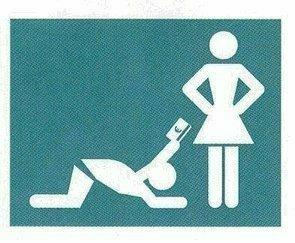Strong Characters
 I've probably spent way too much time writing BDSM. I'm seeing female dominance at every corner, empowered women and grateful men--not castrated ones, but men who are happy to share the position of being strong and responsible.
I've probably spent way too much time writing BDSM. I'm seeing female dominance at every corner, empowered women and grateful men--not castrated ones, but men who are happy to share the position of being strong and responsible.This subgenre of erotic romance with kinky elments has bled over into my everyday life, though. I find myself having less patience with wimpy women who depend upon others to do what needs to be done, things they should do for themselves.
Ditto for characters.
How often have you read a book that went from being a hand-hugger to a wall-banger simply because the characters were weak? They didn't grow, evolve, or even disintegrate. Nothing happened to show they'd progressed or regressed, leaving them stagnant and boring.
I used to believe that the plot was everything. I'd written and won with so many script contests that I forgot how to write interesting characters. Then a lovely friend named June Park (The Bingo Queens of Paradise) pulled me aside and handed me a book on characterization. She introduced me (quite literarly) to the late, great Jack Bickham, in whose seminars I learned more in a few hours than I had in years of reading and writing on my own. Jack turned me on to his mentor, Dwight Swain, author of the out-of-print Techniques of the Selling Writer, and the list goes on.

All 3 authors get the Sunny Lyn seal of approval:
What I mainly learned from these mentors was that "something" called plot can happen to anyone. What distinguishes a good read from a bad one and elevates a good one to great is the emotional growth taking place within the characters depicted.
If all a character does is drink coffee or liquor, smoke cigarettes, eat, pace, sigh, nod, or screw...that's lazy writing. If all they do is internalize their emotions, that's lazy writing's evil twin, lack of focus. Writing all this mundane action or boring internal monologue coupled with poor writing skills and bad grammar will absolutely kill whatever chances the manuscript has of being read by anyone with time on their hands.
Giving these characters a great plot won't help the book. Having them go through scene and sequel, with a character arc accompanying the action, forcing character growth, will be the shot in the arm the manuscript needs.
What are some books that teach or favorite writers who depict great character to you?
~ Lyn
p.s. ~ Have to announce while I'm here...made another sale this past week, this one to Liquid Silver Books for my own erotic astrology anthology, 4 stories. It should debut within 3-4 months, maybe earlier.



4 Comments:
CONGRATS BABE!!!!!!!
Honey Characterization is king, queen and Chief whip cracker for me as a reader and a writer.
Characterization has never been a huge problem for me--I won't abide stupid--it's the plotting that gets me in trouble. To that end I LOVE The Writer's Journey (apparently I'm a very linear thinker) and there's a guy out here on the internet htat has The Snowflake--plotters heaven even if I don't follow every step.
Kay Hooper does great characters in her FBI series--each one is simliliar (THEY are all psychic) but they all have different problems, so very not cookie cutter--and SEP of course who I think is just a goddess does fab chracterization.
I think TO KILL AN MOCKINGBIRD is some of the greatest characterization I've ever seen.
cece, Snowflake technique is something merry loves, too - i haven't caught onto it yet but intend to go back.
and, merry, TKAM is one of my all-time favorite books!
Authors I read both for pleasure, and to learn: Martin Cruz Smith, John le Carre. They are true masters of characterization. If you've never read Smith, try Rose.
I love writing (and reading) strong female characters, by the way.
Post a Comment
<< Home